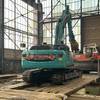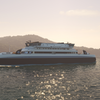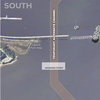EMSA Maritime Accident Review 2008
On June 16, coinciding with the official opening of its headquarters in Lisbon, the Lisbon-based European Maritime Safety Agency (EMSA) released its second annual Maritime Accident Review. This year's issue of the review, which covers the year 2008, shows that 754 vessels were involved in 670 accidents (sinkings, collisions, groundings, fires/explosions and other significant accidents) in and around EU waters during 2008. This compares with 762 vessels involved in 715 accidents in 2007, and 535 vessels involved in 505 accidents during 2006. In 2008, 82 seafarers are reported to have lost their lives on ships operating in and around EU waters, the same figure as in 2007, yet up from 76 in 2006.
Other key findings in the review are that, although accidental pollution has substantially decreased in recent years, loss of life, and the number and cost of accidents remain significantly higher than 3-5 years ago. Deliberate pollution also remains at high levels. In addition, while an overall decrease in accidents was reported in comparison to 2007, monthly patterns reveal that the lower 2008 toll is explained by a slump in maritime traffic in December, attributable to the economic downturn.
“Maritime accident reviews are a yearly product which enable EMSA to inform the EU maritime community and EU citizens about the shipping accidents that occur in and around EU waters,” commented Agency Executive Director Willem de Ruiter. “This year's review again shows that accidents in EU waters lead to enormous costs and significant loss of life. There are also major concerns that, although the shipping downturn will give owners and operators the time to carry out much needed maintenance that was delayed during the boom period, many will not do so because they have reduced funds to pay for such activities. The fight to reduce the number, severity and cost of accidents must continue unabated if seriously negative consequences on human activities, the environment and the European economy are to be avoided in the years ahead.”
While weather, geography and other factors play a part in accidents that occur, the Maritime Accident Review 2008 finds a relationship between the number and seriousness of accidents in and around EU waters, and the shipping boom and subsequent slump towards the end of 2008. These findings are consistent with a similar, recent global reduction in accidents noted by other maritime organisations. Yet prior to the fall-off in the number of vessel accidents at the end of 2008, statistics were showing that a ship was twice as likely to be involved in a serious grounding, collision or contact accident in 2008 compared to five years before. Estimates also suggested that the costs of these accidents had doubled. However, even taking into account the slump, both the safety and cost situations have worsened significantly in recent years.
The Maritime Accident Review 2008 also observes that many accidents happen in northern waters during the winter months when the weather is at its worst, with crews having to navigate ships under the most difficult of conditions, and often in confined waters. The worst months for loss of life in 2008 were January (18), September (12) and December (18), with the reason for the unusually high September figure being the loss of the general cargo ship Tolstoy in the Black Sea off Romania. The summer months typically account for a high share of collisions and contacts, with the main reason for this being that the number of tourist ferry sailings is at its height.
Almost 37% of the 82 lives reported as lost on vessels in and around EU waters in 2008 were on fishing vessels, while around 25% were on general cargo ships. On the environmental side, accidental pollution decreased even further during 2008, with only a few thousand tonnes reported as being spilled. In the past, individual tanker spills have been huge, the most recent being 63,000 tonnes by the Prestige off Spain in 2002. However, EMSA’s Clean SeaNet system is showing that deliberate pollution still appears to be significant, with thousands of potential spills spotted in 2008 and hundreds confirmed after checks by Member States. EMSA is working, together with the European Commission, to address each of these key issues.










